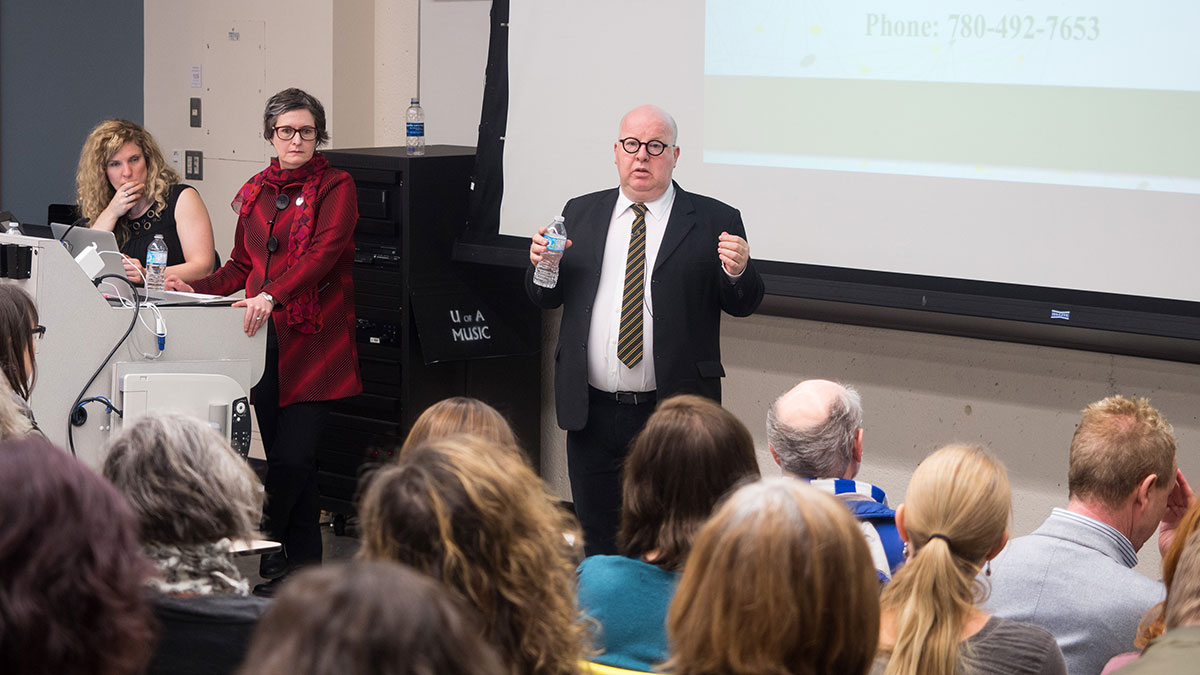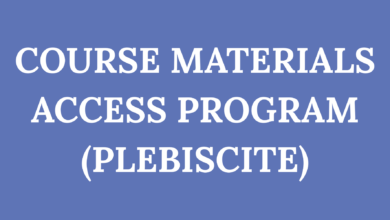Staff, students bring concerns to BA Renewal Town Hall
 Christina Varvis
Christina VarvisThe proposed thematic pathways and elimination of core requirements for the Bachelor of Arts program came under fire at the Faculty of Arts’ town hall on Friday, where the recommended changes to the degree were up for public discussion.
Associate Dean (Teaching and Learning) Allen Ball fielded questions and comments from an overcapacity crowd of students, faculty and staff in the Fine Arts Building theatre, as he presented the ongoing BA Curriculum Renewal Consultation Process. The revised changes to the BA program were created with the scope of making the U of A a more attractive and competitive institution in Canada, as they currently have the highest number of basic core credits required for graduation, Ball said in a short presentation before opening up the floor to the audience.
The Dean’s Executive Committee is proposing that the BA program sever its core requirements, a total of 36 credits, and the requirement of a minor for graduation. With the BA program up for renewal, it is being proposed that the general core requirements be replaced with five thematic pathways, which, according to Ball, will guide students in planning their first year of studies.
Cutting the current basic core requirements of the BA would include axing the language-other-than-English requirement, which drew ire from some town hall attendees.
“I’m just wondering why you think this is a good thing and something we should be doing,” one student asked Ball. “Language courses are awful, and they’re a lot of work, but I think skills I gained from them. You learn to memorize really quickly and really well. I just wonder if we’re just doing future students a disservice by not having them.”
Carolyn Sale, a professor in English and Film Studies, told Ball that it’s “absurd” to tell students they don’t have to learn another language in the 21st century, noting how the current generation seems to be moving towards a multilingual society.
“If we wanted to actually be progressing towards the future, we would actually be increasing our language requirements,” she said. “So students walk through that door with a European language, or knowledge of an Asian language, and maybe knowledge of an indigenous language. Lets get to those proper discussions of what we, as a faculty, truly value.”
Other students in the audience contested the language-other-than-English requirement, saying how it made transferring from other institutions difficult, and how the mandatory language courses “didn’t really add” to their program’s value.
“I took two (language) courses, just finished them in winter semester, and I can’t remember a single thing,” one student said.
For another student, the “discovery aspect” of language-other-than-English courses, among other core requirements, are essential for a student’s degree and finding out what they want to eventually major in. She also noted the stability the language-other-than-English requirement provides. Senior language courses are sometimes offered once per year and sometimes cut, and the worry was that some junior level language courses face the same fate due to low attendance because students have more choice.
One faculty member said she was in favour of making the requirements more flexible, as they get in the way of students who wish to double major, but drew the line between flexibility and eliminating requirements.
“Why don’t we just look at the requirements we have now, make the ones that are too rigid more flexible, and talk to undergraduate student advisors about the problems students face,” she said.
Another professor said he supported the proposal and cutting requirements, on the basis that university students are adults, and that they should be depended on to make their own academic decisions.
“Each individual student should know what is in his or her best interest, as far as his or her own self-fashioning,” he said. “We ought to trust students … students are adults. Let them choose. Make them choose.”
The pathways, which some attendees called “vague,” are still in preliminary planning stages, and should “articulate what we stand for as the foundational principles and objectives in the Faculty of Arts,” Ball said. The pathways for each BA major are to be decided on by the department that major is in.
The five thematic pathways are:
- Analysis and Interpretation
- Research, Creation and Inquiry
- Communication and Culture
- Global Citizenship
- Lifelong, Adaptive and Engaged Learning
Ball used the example of a program that highlighted global citizenship and communication and culture, which would pull its requirements from courses in the departments of anthropology, human geography, philosophy, political science, history, MLCS and sociology, among others. But Ball stressed that “nothing is set in stone” regarding the pathways and how they were presented at the town hall and document circulated on the U of A website.
Following the conclusion of the Town Hall, Ball said he was pleased with the amount of conversation and feedback from students and faculty. In order to implement the changes by his goal of Fall 2018, the renewal would need to be ratified by the end of the 2015–16 academic year. This would give departments the opportunity to identify and adjust their program’s respective requirements for the 2017–18 academic year.
“From the comments, maybe it might be useful to articulate some of those values in a tangible way,” Ball said. “I think most people in this faculty are aware of the number of people dropping majors and it’s of concern to them. I think most people realize we need some form of change — unless I’m completely mistaken.”





wtf